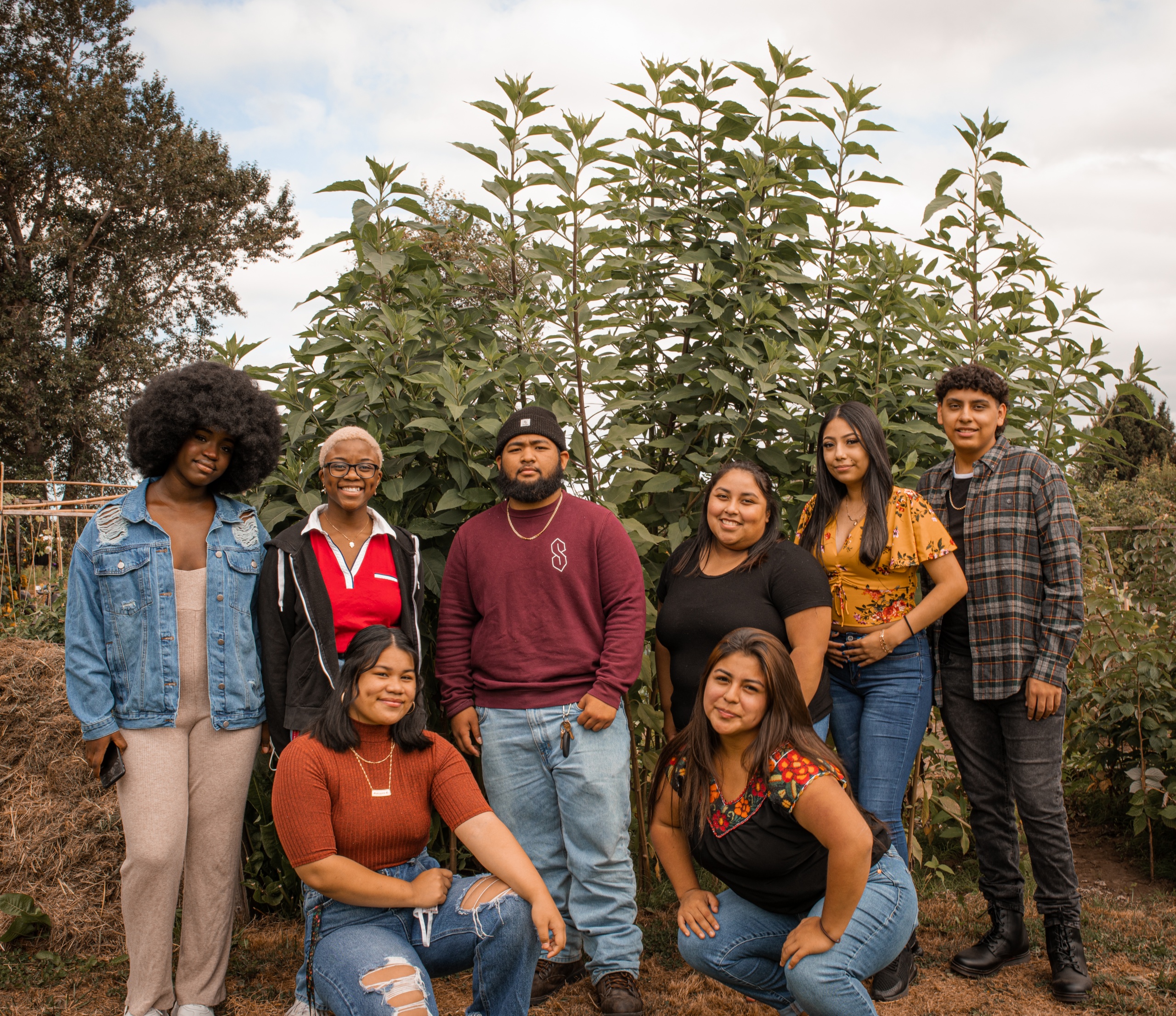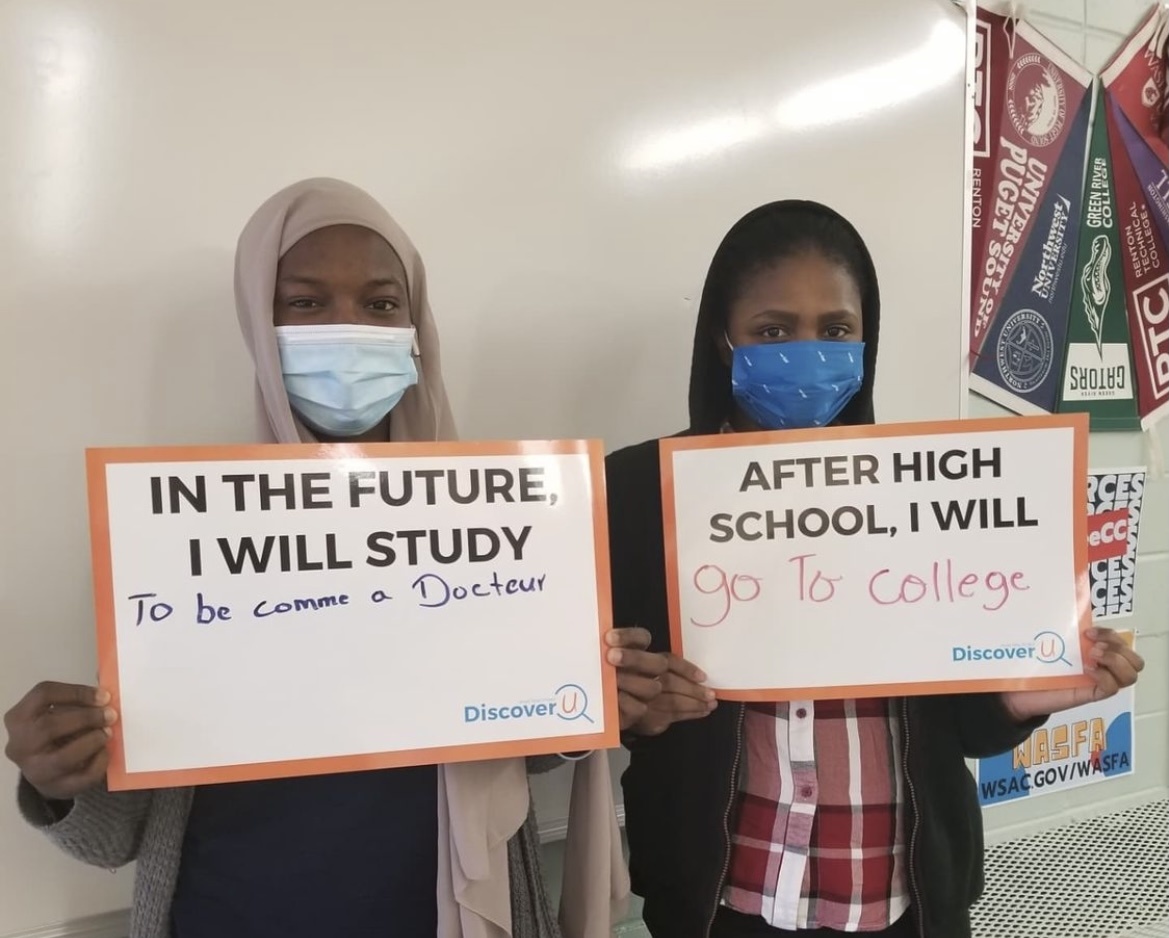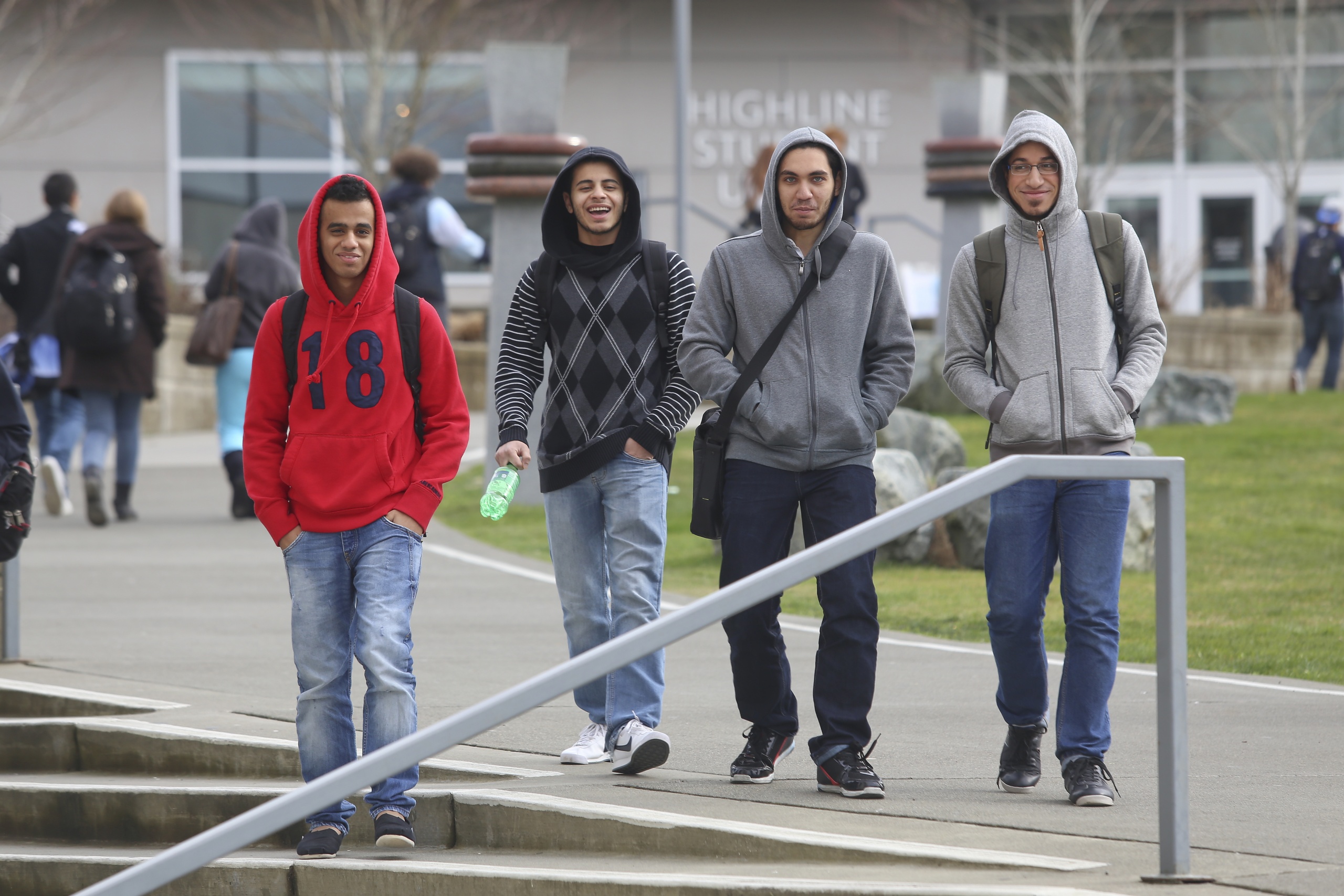
Auburn youth activists featured in Where Roses Grow, a podcast hosted by Road Map Project Youth Storyteller Erandi Flores-Bucio

Students during DiscoverU Week 2021.

Students at Highline College. A case study of the community college's efforts to boost placement and reduce inequities is features in the Inequity by Design report.
This year, like the one before it, exacerbated the inequities communities of color and low-income communities face in our region and across the nation. It also brought opportunities to recognize the emerging needs of students and families and to address them by leading with race and centering community. In collective action, we must continue to shift our systems. To everyone working in service of Road Map Project goals: Thank you for a great year!
Youth-led solutions to improve mental health and wellbeing
In response to the 2020 report, In Their Own Words: Young People Describe the Impact of COVID-19, published in collaboration with Road Map Project partners King County Reconnect to Opportunity, Soar, and CCER and 22 young leaders, the Youth Healing Project was developed. Funded by The Aspen Institute and King County Best Starts for Kids, with technical assistance and facilitation support provided by citiesRISE, $135,500 was awarded to grassroots organizations and young leaders advancing youth-led solutions that improve the mental health, connection and wellbeing of young people ages 16-24 in South King County.
Community-based networks to support elementary learning
During the pandemic, networks in Renton and Tukwila leaned on each other to support their communities through intentional relationship building between schools, families, and community-based organizations. Continuing on from 2020, the Community Center for Education Results (CCER) launched its third round of the Elementary Learning Support Grant opportunity to support projects for students in Tukwila elementary schools and/or the Renton Innovation Zone (RIZ) schools. The projects were selected by local community members with a focus on the current needs of students and families. In 2020-21, almost $400,000 was disbursed for elementary learning support projects.
Building capacity to support families and schools to thrive together
After two years of implementation, an external Year 1 evaluation of the Road Map Project Academic Parent Teacher Teams initiative shared how participating schools received support from coaches to deepen and expand family engagement, with schools reporting innovation and growth in family-school relationships. This research-based model of family engagement supported seven schools in two districts – Highline Public Schools and Seattle Public Schools – to develop educator and family capacity to improve student academic outcomes. Despite a challenging remote learning experience, participating schools are seeing positive changes in overall culture and capacity for partnerships.
A call to action to end racist college placement policies and practices
In June 2021, after three years of research and close partnership, Puget Sound College and Career Network, Highline College, and CCER released an extensive report highlighting how college placement policies perpetuate institutional racism. The work was a result of the collective expertise and labor of many individuals and organizations working together with and for students in South King County and South Seattle. Findings revealed how our region’s current college and technical college placement policies and practices perpetuate inequity between racial groups. Our partners intend to keep the momentum going, including advocating for a statewide paradigm shift to reduce and eliminate the harm caused to students and communities of color.
English Language Learner Work Group expands statewide
OneAmerica announced the English Language Learners Work Group would expand statewide and also expand to include early learning as part of their advocacy efforts. Through a community-based participatory visioning process, they highlighted the ways they will center communities, advocate for early learning dual language education, and continue to advocate for emergent multilingual students.
Rapid Resource Fund shifts funding to small community-based organizations
Last year’s funding for the Rapid Resource Fund intentionally focused on smaller organizations that are led by and serving people of color who are responding to community needs. Members of the Community Leadership Team worked with funders to revise grantmaking guidelines and make funding decisions that centered community needs. Grants went out to five community-based projects that focused on supporting mental health, academic supports, and basic needs.
YDEKC reconnects with community and continues youth and racial justice advocacy
In March 2021, Youth Development Executives of King County (YDEKC) presented their Thriving Leaders series to restore community connection, renew a sense of hope in the wake of the pandemic, and center youth decision-making and leadership. They published several impact stories and in Oct., implemented the Thriving Leaders of Color Fund to support member organizations to advance, rejuvenate, and/or celebrate leaders of color, and in Nov. held their annual member summit virtually, in addition to continued advocacy for youth throughout the year.
Community Leadership Team reconnects and identifies areas of focus
Post 2020, CCER met individually with each Community Leadership Team member to intentionally build relationships, reflect, and reexamine priorities and bodies of work for 2021. Through a series of three framing meetings the Team identified three buckets to focus their efforts towards: students, community, and leading with race. They began working on a Beloved Blackness statement, evaluated a landscape analysis of partner organizations in the region, and were pivotal participants in developing a community-centered grantmaking criteria for the Rapid Resource Fund.
Parent Leadership Team completes strategic planning
After formalizing the role of the Road Map Project Parent Leadership Team (PLT) in building regional capacity for grassroots parent advocacy in our region, the PLT rolled out their Facebook page to connect parents with resources and invite conversations. The PLT also completed their strategic planning process and look forward to sharing their strategy, aligned partnerships and process for developing a community lead strategy in the new year focused on family alliance and education reform, based on our communities’ lived experience.
Best Starts for Kids Implementation Plan moves to next phase
In November 2021, the King County Council voted unanimously to pass the Best Starts for Kids budget, a step that finalizes the Implementation Plan. With strong Council and community support for this plan, Best Starts for Kids can move forward to the next phase. The comprehensive supports include the PSESD-supported King County Promise. Funding opportunities will be shared throughout 2022.
Youth Storytellers Project elevates youth expertise and stories
To center community and lead with race, we need to reimagine who “experts” are, resource young people of color to own their stories, and follow their visions of transformation. In summer 2021, CCER’s new initiative trained and collaborated with five Road Map Project Youth Storytellers who developed creative communications projects to amplify their own stories and their community stories. Their projects covered mental health and wellness, bringing awareness to inequalities students with disabilities face, stories of community leaders and youth working for food justice, storytelling on how to support dual language classrooms, and a podcast on youth activism. The storytellers moderated Facebook Live panels and shared their projects in a final showcase event. Learn more about their projects.
Equity & Impact: Community at the Center
Our latest report from Nov. 2021 shared perspectives from youth, parents, community-based organizations, and educators in the Road Map Project region about the impact of the last two years, and their visions for a more equitable education system. This report also shares CCER’s efforts as the Road Map Project’s backbone organization to center community and lead with race, highlighting collaborative efforts with partners to center young people, particularly young people of color, in our region.
DiscoverU Week continues to help students explore their dreams and goals
The ninth annual DiscoverU week was held in Oct. 2021. Classrooms and youth program providers all over the region held college and career exploration activities for students of all grades. They engaged in a classroom door decoration contest and a student art contest which marked a first for this year. CCER also awarded three sets of grants to community-based organizations to host events, to teachers for classroom activities, and to family engagement practitioners for involving families in college & career exploration.
Data for Action series launched
CCER launched a new blog series in response to community concerns and emerging advocacy priorities. The series pairs data with stories and will be co-authored by different groups working across the education continuum. The first blog post shared new indicator results in the updated Data Dashboard and the second looked at the latest results from the College and Career Leadership Institute staff survey which revealed to staff the gaps in their beliefs and perceptions about students’ post secondary aspirations.
College & Career Leadership Institute sees shift in adult mindsets
During COVID-19 and virtual learning the College & Career Leadership Institute learned that 95 percent of students in the Road Map region still aspire to attend some form of post-secondary education. Additionally, CCLI saw an adult mindset shift over the last year across 16 participating high schools in regards to beliefs about student aspirations and expectations in regards to post-secondary education. There was a 4 percent point increase in adults’ beliefs of our students’ aspirations and a 5 percent point increase in adults’ beliefs of our students’ expectations.
King County Reengagement Providers Network works towards racial equity
The King County Reengagement Provider Network identified four areas of focus for the 2021-2022 academic year: racial equity, with a focus on Black youth; youth mental health; data capacity and culture; and college and career culture. King County and CCER, as the Network conveners and facilitators, identified and contracted with consultants, Dr. Caprice Hollins, Kyana Wheeler, and Dr. Debra Sullivan to assist the network providers in their awareness, knowledge, and praxis in leading with race and centering the strengths and needs of young people.
Posted in: College and Career Readiness , College and Career Success , Community Leadership Team , Data and Research , Early Learning & Elementary Success , English Language Learners , Opportunity Youth